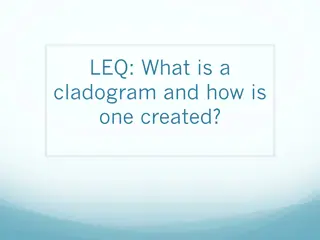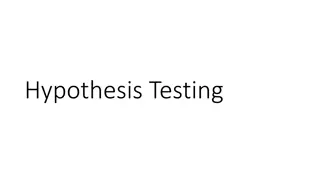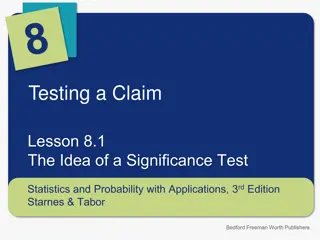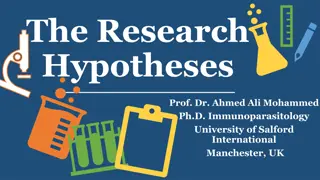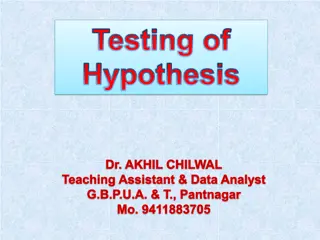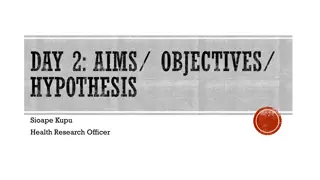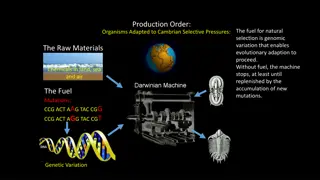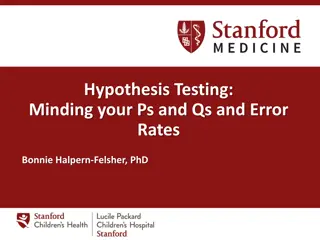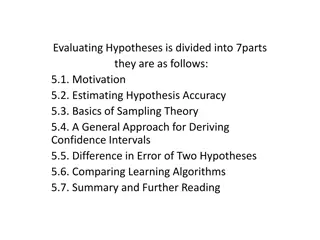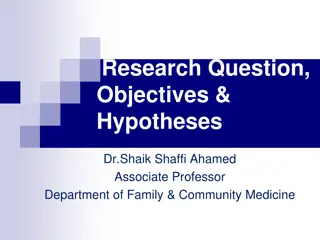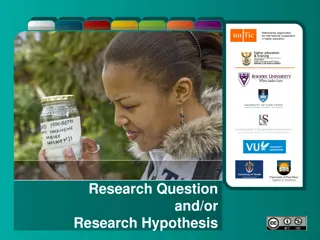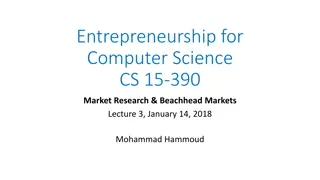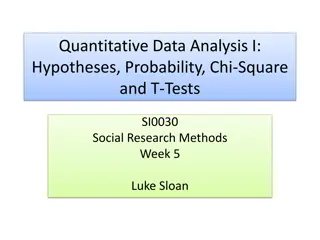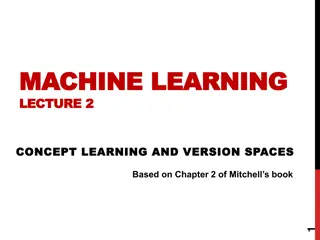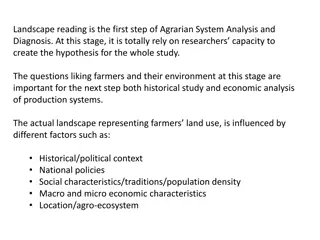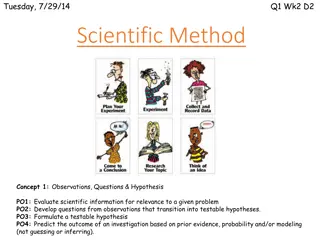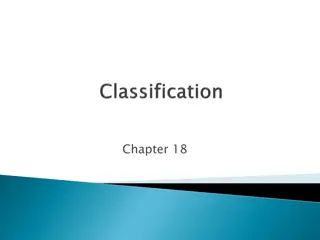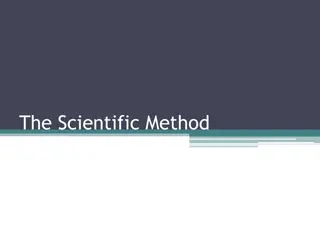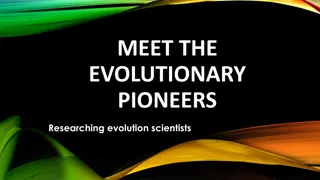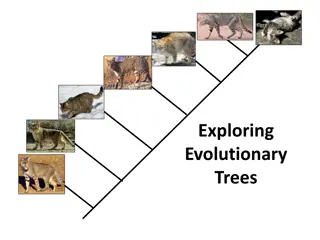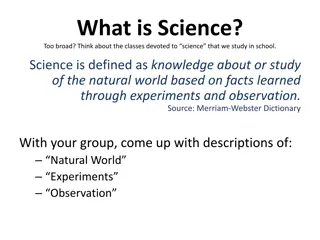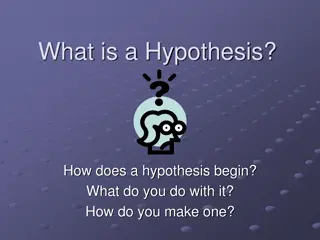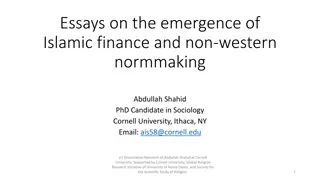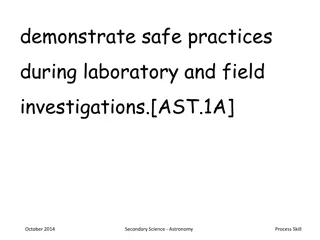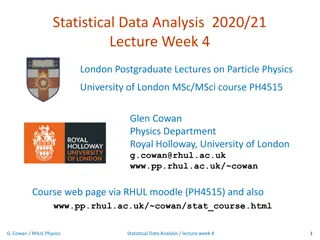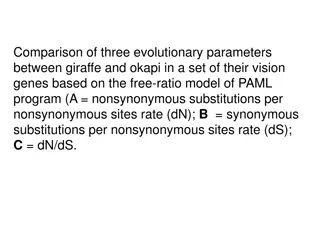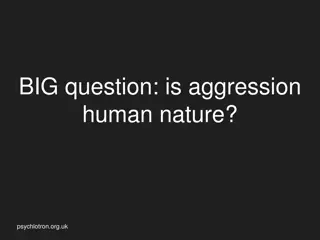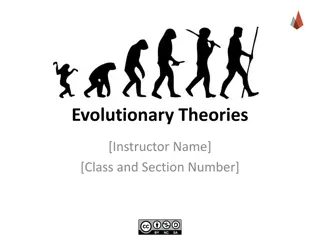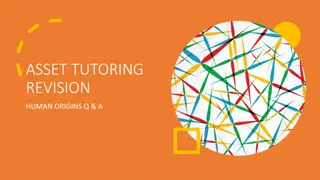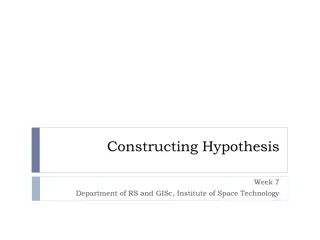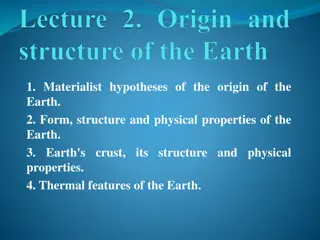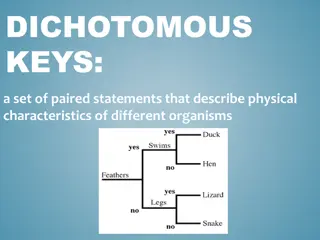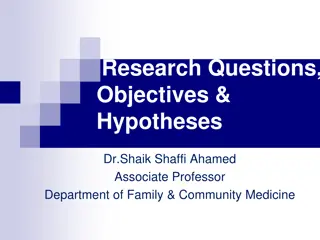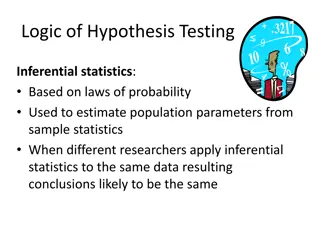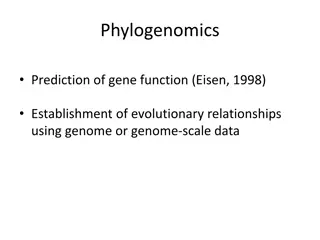Inferential Statistics
Hypothesis testing is a key aspect of inferential statistics, allowing researchers to make conclusions about populations based on sample data. This process involves formulating hypotheses, conducting experiments, and determining the probability of results under different scenarios. By comparing the
0 views • 28 slides
Understanding Cladograms and Phylogenetic Analysis
Cladograms are used in cladistics to illustrate evolutionary relationships between organisms based on shared ancestral and derived characters. They are created by grouping species by common descent, forming clades that include an ancestral species and all its descendants. Valid clades are monophylet
0 views • 11 slides
Understanding the Scientific Method in Measurements and Calculations
Explore the scientific method in detail, including observing, collecting data, formulating hypotheses, testing hypotheses, and formulating theories with practical examples. Understand the importance of experimentation and how it leads to the development of scientific theories. Engage in activities t
6 views • 43 slides
Understanding Hypothesis Testing and Null vs. Alternative Hypotheses
A hypothesis is a prediction about a study's outcome, guiding research direction. Stating hypotheses forces deep thinking and making specific predictions but may introduce bias. Null hypothesis (H0) states no effect, while alternative hypothesis (Ha) claims an effect in the population. Researchers e
0 views • 7 slides
Understanding Significance Testing in Statistics
Significance testing is a vital concept in statistics used to analyze data and make informed conclusions about population parameters. This lesson delves into the significance test procedure, hypotheses formulation, interpreting P-values, and drawing appropriate conclusions based on statistical evide
1 views • 9 slides
Importance of Testable Hypotheses in Scientific Research
Hypotheses play a crucial role in scientific research as they provide a clear statement that can be tested. A genuine research hypothesis must be specific, testable, and falsifiable. It guides researchers in planning studies and helps in determining the outcomes. A good research hypothesis is clear,
0 views • 14 slides
Understanding Hypothesis Testing in Statistical Analysis
Statistical analysis aims to make inferences about populations based on sample data. Hypothesis testing is a crucial aspect where decisions are made regarding accepting or rejecting specific values or parameters. Statistical and parametric hypotheses, null hypotheses, and decision problems are key c
1 views • 34 slides
Understanding Research Aims, Objectives, and Hypothesis in Health Research
This content delves into the importance of defining research aims, objectives, and hypotheses in health research. It explains how research aims clarify the study's goals, objectives outline specific tasks to achieve those goals, and hypotheses help in making predictions. It also discusses the proces
0 views • 17 slides
Insights into Evolutionary Adaptation and Genetic Variation
The production order highlights the essential role of genomic variation as fuel for natural selection, driving evolutionary adaptation. The Cambrian Explosion timeframe reveals a rapid increase in evolutionary adaptation, showcasing the appearance of diverse animal phyla over a relatively short peri
5 views • 6 slides
Understanding Hypothesis Testing in Statistics
Hypothesis testing is essential in scientific inquiry, involving the formulation of null and alternative hypotheses at a chosen level of significance. Statistical hypotheses focus on population characteristics and are tested on samples using probability concepts. The null hypothesis assumes no effec
0 views • 26 slides
Understanding Hypothesis Evaluation in Machine Learning
Evaluating hypotheses in machine learning is crucial for assessing accuracy and making informed decisions. This process involves estimating hypothesis accuracy, sampling theory basics, deriving confidence intervals, comparing learning algorithms, and more. Motivated by questions about accuracy estim
0 views • 26 slides
Research Questions, Objectives, and Hypotheses in Diabetes Management
Explore the formulation of research questions, setting study objectives, and defining hypotheses in the context of diabetes mellitus management. Delve into the prevalence of diabetes in Saudi Arabia, glycemic control in diabetic patients, and addressing key research questions to reduce the impact of
0 views • 43 slides
Effective Guidance on Research Questions and Hypothesis Development
Understanding the importance of formulating clear research questions or hypotheses is crucial for the success of a study. Research questions guide the research process, while hypotheses propose explanations to be proven. This content emphasizes the significance of correctly developing research quest
0 views • 14 slides
Understanding Market Research and Beachhead Markets in Entrepreneurship
The session delved into the importance of market research, outlining primary and secondary types as well as qualitative and quantitative approaches. It emphasized the need for direct interaction with potential customers and exploring new hypotheses through qualitative research. The significance of g
3 views • 22 slides
Understanding Hypotheses, Probability, and Statistical Tests in Social Research
This content delves into formulating hypotheses in social science, selecting statistical tests based on variables' measurement levels, understanding probability in statistical analysis, and distinguishing between null and alternative hypotheses. It emphasizes the research process involving hypothesi
5 views • 21 slides
Understanding Concept Learning and Version Spaces in Machine Learning
In the field of machine learning, concept learning involves inferring general definitions of concepts from labeled examples. This process aims to approximate the best concept description from a set of possible hypotheses. The concept learning approach is illustrated through examples, such as predict
0 views • 18 slides
Computing Triplet and Quartet Distances Between Evolutionary Trees
Study on computing triplet and quartet distances in evolutionary trees, comparing rooted vs. unrooted, binary vs. arbitrary degree trees. Discusses algorithms, experimental results, and evolutionary tree construction methods. Includes analysis on cultural phylogenetics and evolutionary tree comparis
0 views • 27 slides
Understanding Landscape in Agrarian System Analysis
Landscape reading is the initial step in Agrarian System Analysis where researchers form hypotheses based on farmers' interactions with their environment. Factors like historical context, policies, and socio-economic conditions influence farmers' land use. Zoning the landscape helps explain agricult
1 views • 4 slides
Understanding the Scientific Method: Observations, Questions, and Hypotheses
Explore the scientific method concept of making observations, asking questions, and forming hypotheses. Learn the difference between causal and descriptive questions and practice applying them. Understand how to approach a situation like a non-starting washing machine through causal and descriptive
0 views • 28 slides
Understanding Taxonomy and Classification in Biology
Scientists use classification to group organisms logically, making it easier to study life's diversity. Taxonomy assigns universally accepted names to organisms using binomial nomenclature. Carolus Linnaeus developed this system, organizing organisms into species, genus, family, order, class, phylum
0 views • 11 slides
Understanding the Scientific Method and Examples
The scientific method is a systematic approach to answering questions and solving problems. It involves steps like observation, asking questions, forming hypotheses, collecting data, organizing data, and drawing conclusions. This method helps researchers find answers efficiently and allows others to
0 views • 9 slides
Evolutionary Pioneers: Anning, Darwin, Wallace - Key Figures in Evolutionary Theory
Meet the evolutionary pioneers - Mary Anning, Charles Darwin, and Alfred Russel Wallace, who played crucial roles in the development of evolutionary theory. Learn about their groundbreaking discoveries, challenges faced, and lasting impact on the scientific community.
0 views • 7 slides
Exploring Evolutionary Trees and Family Lineages
Dive into the world of evolutionary trees and family lineages through captivating visuals and informative illustrations. Explore the relationships between species, understand genetic connections, and discover how traits evolve and spread through generations. From evolutionary history to family trees
0 views • 25 slides
Understanding Science: Experiments, Observations, and Hypotheses
Knowledge about the natural world is gained through experiments and observation in science classes. Asking testable questions leads to formulating hypotheses, which offer possible explanations for phenomena observed. Investigating questions with scientific procedures, such as tracking Daphnia heart
0 views • 21 slides
Understanding the Hypothesis in Scientific Research
A hypothesis in scientific research is a proposed explanation for a phenomenon based on observations and existing knowledge. Scientists use hypotheses to formulate testable predictions and guide their investigations. This process is a fundamental step in the scientific method, involving asking quest
0 views • 17 slides
Emergence of Islamic Finance: Dynamics and Hypotheses
Exploring the emergence of Islamic finance and non-western norm-making through the research of Abdullah Shahid, a PhD candidate at Cornell University. The study delves into the dynamics of Islamic development financing, the context of the Islamic Development Bank, and various hypotheses related to f
0 views • 17 slides
Best Practices in Laboratory and Field Investigations for Secondary Science - Astronomy
This content covers various aspects of safe practices in laboratory and field investigations related to secondary science - Astronomy. It includes information on resource conservation, disposal/recycling of materials, understanding the limitations of science, scientific hypotheses, theories, disting
0 views • 16 slides
Computational Learning Theory: An Overview
Computational Learning Theory explores inductive learning algorithms that generate hypotheses from training sets, emphasizing the uncertainty of generalization. The theory introduces probabilities to measure correctness and certainty, addressing challenges in learning hidden concepts. Through exampl
0 views • 43 slides
Understanding Hypotheses and Tests in Statistical Data Analysis
This material covers essential topics on hypotheses and tests in statistical data analysis, including defining hypotheses, critical regions, simple vs. composite hypotheses, and the goal of tests. It emphasizes the importance of critical regions in determining the validity of hypotheses and explores
0 views • 48 slides
Comparative Analysis of Evolutionary Parameters in Giraffe and Okapi Vision Genes
This presentation compares three evolutionary parameters (dN, dS, dN/dS) between giraffe and okapi in a set of vision genes using the free-ratio model of the PAML program. The images illustrate the differences in nonsynonymous and synonymous substitutions, as well as the ratio of nonsynonymous to sy
0 views • 4 slides
Understanding Aggression: Exploring Its Evolutionary Roots
Delve into the complexities of human aggression, questioning whether it is inherent or a learned behavior. Explore evolutionary theories and biological perspectives on the causes of aggression, examining how factors such as genetics, brain structures, hormones, and environmental pressures may influe
0 views • 11 slides
Understanding Evolutionary Theories and Strategies
Exploring evolutionary theories such as Sexual Selection Theory and Gene Selection Theory sheds light on how characteristics evolve for mating advantage. Insights into intersexual and intrasexual competition offer a deeper understanding of mate selection preferences. Gene selection mechanisms influe
0 views • 20 slides
Exploring Human Origins Through Hominid Fossils and Evolutionary Traits
Delve into the fascinating world of human origins, examining hominid fossils, anatomical traits, and evolutionary evidence. Learn about early species like Ardipithecus ramidus, differentiate African apes from modern humans, and analyze the genetic lineage supporting human evolution. Explore tables,
0 views • 14 slides
Understanding Hypothesis Testing in Statistics
Hypothesis testing is a fundamental concept in statistics that involves testing statements about population parameters. This content covers the basics of hypothesis testing, including types of hypotheses, examples, and the procedure involved in statistical hypothesis testing. It also explores the im
0 views • 23 slides
Understanding Hypotheses in Research: Importance and Development
Hypotheses play a crucial role in research by providing direction, clarity, and focus to a study. They are educated guesses that guide researchers in testing theories and making predictions about the relationship between variables. Developing a hypothesis involves common-sense reasoning, research mo
0 views • 22 slides
Hypotheses on the Origin of Earth and Earth's Formation
Various materialist hypotheses proposed by scientists such as Kant, Laplace, Schmidt, and Fesenkov regarding the origin of Earth and the solar system. These hypotheses suggest different processes, including the formation from primary dusty matter, hot nebula, interstellar meteorite dust, and gas-dus
0 views • 16 slides
Understanding Dichotomous Keys and Cladograms in Evolutionary Biology
Dichotomous keys are utilized to classify different organisms based on their physical characteristics, while cladograms depict evolutionary relationships. Derived traits play a crucial role in understanding evolutionary history, indicating features present in later organisms but not earlier ones. Pr
0 views • 16 slides
Formulation of Research Questions, Objectives, and Hypotheses in Epidemiological Studies
Explore the importance of defining research questions, objectives, and hypotheses in epidemiological research, illustrated through examples from studies on diabetes mellitus in Saudi Arabia. Understand the steps involved in crafting clear objectives and hypotheses to address public health challenges
0 views • 37 slides
Understanding Inferential Statistics and Hypothesis Testing in Research
Inferential statistics in research involve estimating population parameters from sample statistics and making decisions based on probability. Researchers follow a set process, starting with preparing for a study, defining variables, stating hypotheses, selecting appropriate tests, analyzing data, an
0 views • 30 slides
Understanding Phylogenomics and Gene Function Prediction in Evolutionary Biology
Explore the significance of phylogenomics in predicting gene functions and establishing evolutionary relationships using genome-scale data. Learn about the challenges of using single genes or a few genes in phylogenetic analysis, the importance of analyzing multilocus data, and the need for multiple
0 views • 24 slides

